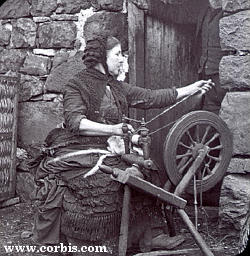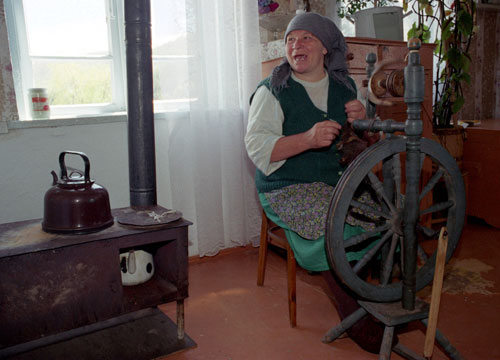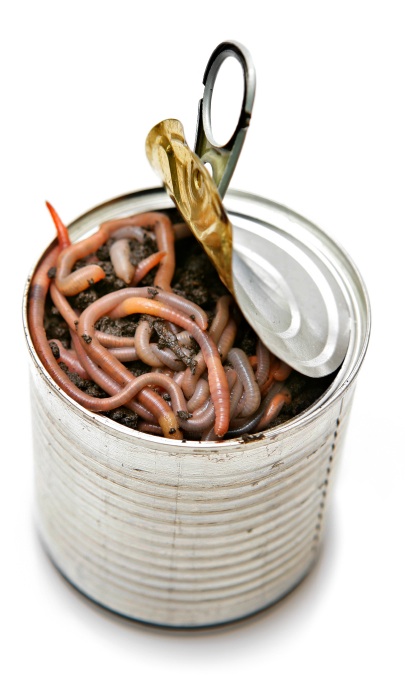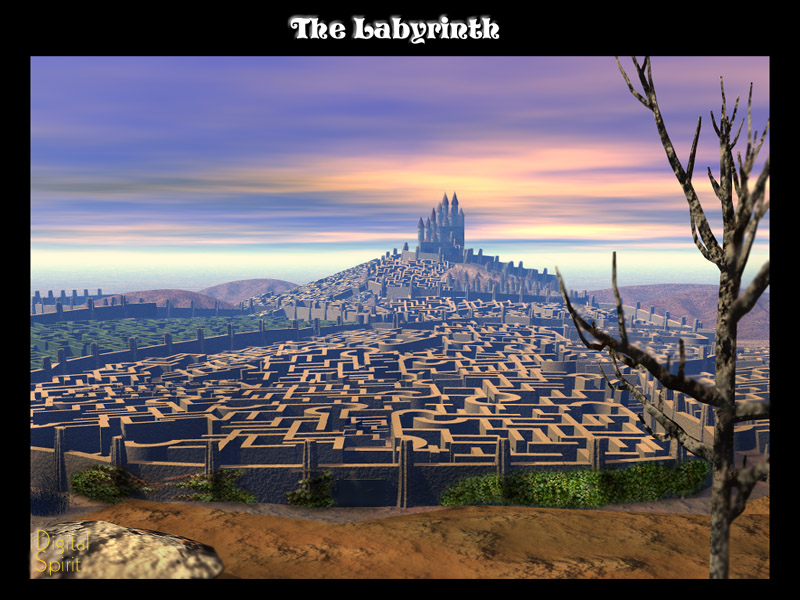We will step back a bit, backpedal, and go up to see who our parents/ծնողք are.
Hopefully from here on, if I don’t get sidetracked we will expand horizontally.
----
ԱՅՐ ՈՒ ԿԻՆ Man and Woman.
ԱՄՈՒՍԻՆ կնոչ մարդը կամ մարդու կինը Կամուած է «ամ համ միասին եւ ուս= վարժուիլ, սովորիլ”**
In other words an “amousin” is the companion that one gets acquainted, accustomed to.
As seen above it is a generic, genderless word, even if in time it has ended up exclusively to mean “husband/ male spouse, specially ine the western Armenian, in Eastern Armenian it is still used to mean either the male or the female partner. The word is synonymous with thhttp://www.takeourword.com/images/spinster.jpge English “spouse”, the French “epouse” , just as in the Italian “sposare” means to marry.
----
Main Entry: 1spouse 
Pronunciation: \ˈspau̇s also ˈspau̇z\
Function: noun
Etymology: Middle English, from Anglo-French espus (masculine) & espuse (feminine), from Latin sponsus betrothed man, groom & sponsa betrothed woman, bride, both from sponsus, past participle of spondēre to promise, betroth; akin to Greek spendein to pour a libation, Hittite šipant-
Date: 13th century
: married person : husband, wife
----
**Ուսանող =Student, learner and ուսուցիչ teacher
---
Another word for “spouse/amousin” is
ԿՈՂԱԿԻՑ= Literally, next to ones side/rib. (Is it based on the fable of Adam and his “rib” Eve?)
As long as we are talking about married people and spouses, let us see we call the unmarried;
“amouri”, usually applied to an unmarried male person, just as “bachelor”, even if at times an unmarried female person may be called a “bachelorette” the traditional English words, perhaps pejoratively, as “spinster“*** one that spins the wheels of a spinning wheel , or “old maid/virgin”.
What is the Armenian word for and unmarried woman?
-----
ԱՄՈՒՐԻ, չամուսնացած կամ այրի մնացածfrom the Sanskrit? “am/without” and “ouri/houri/ woman/wife”
---
In another postwe saw the word “azap” to mean “unmarried/amouri”. Yes, that word is widely and freely used in that sense. It is from the Arabic “ ‘-azab/ազաԲ”. My Farsi fonts is defective, I cannot find the ltter “Z”. I’m sure Johannes can. Perhaps a “curse” word (?) as in their culture any boy over the age of 12 who is not yet “ married” is suspect.
----
Spinster

Spinning wheel.

Ճախարակ Common with the Pahlavi “չարխ” to mean “wheel”/անիւ“.

Remember when the Sleeping Beauty was pricked by the spindle and slept all that time?

The above picture of the Armenian woman is too modern. See picture on page 51 here;
http://www.azad-hye....o-1922-1936.pdfNote that some others call that machine “chkhrk/չխրըխ”
** One dictionary says “spinster”= պառաւած աղջիկ, չամուսնացած կին, մանող կին:
Btw, even though in some circles the պառաւ/parav may be used to mean “old/aged//ծեր” it in fact means “old woman/ ծերացած կին/ աղջիկ”
-----
You may choose to ignore the rest.
Why did not Sewak, he being a male person not choose to write “Պառաւում ենք” Instead he wrote “Ծերանում ենք”. Ծեր մարդ v Պառաւ կին
http://www.uzood.com...Ö‚ŐµÖ€-ŐŤÖ‡ŐˇŐŻ----------
Ծերանում ենք
Պարու՛յր Սեւակ,
Ծերանում ենք, սիրելի՜ս,-
Հասակակից կանանց արդեն մենք նայում ենք եղբոր պէս,
Նկատում ենք մատղաշներին,
Որոնք մեզ չեն նկատում.
Ամեն մի նոր ծանոթութ իւն չի վերջանում էլ սիրով,
Ոչ էլ երգով մի անարուստ, բայց պառթկուն ու կրակուած…
Ծերանում ենք, Պարո՛յր Սեւակ,
Ծերանում ենք, սիրելի՜ս.-
Մեր ապստամբ մազերն արդեն կա՛մ պատըժուել են մահով,
Կա՛մ իշխանաց իշխան սանրի խեղճ հպատակ են դարձել.
Մեր խռովկան մատներն արդեն դարձել են հեզ ու լսկան,
Իսկ դաւադիր մեր ոտքերը՝ ընտանեսէր- տնասէր…
Ծերանում ենք, Պարոյ՛ր Սեւակ,
Ծերանում ենք, սիրելի՜.-
Մէ՛կ օր խմում
Եւ երկու՛օր արդեն խումար ենք ընկնում,
Մէ՛կ ժամ քայլում
Եւ երկու՛ ժամ խոսում դրա օգուտից
Կամ վնասից,
Եւ ըստ որում խոսում այնպէ՜ս լրջորէն,
Կարծես մի մեծ գիւտ ենք արել
Կամ հերքում ենք մի հին գիւտ.
Եւ «բուժուել» կամ «հիվանդութիւն» բառերն արդեն օրեցօր
Հոլովվում են ու խոնարհւում աւելի շատ եւ նույնիսկ
Առաւել քիչ դժգոհութեամբ,
Քան թե թաքուն պարծանքով…
Ծերանում ենք, Պարո՛յր Սեւակ,
Ծերանում ենք, սիրելի՜ս.-
Թափառելու ժամ չի մնում,
Չենք հասցնում ձանձրանալ.
Քիչ ենք թախծում մենք անառիթ,
Շատ ենք տխրում առիթով.
Քիչ ենք կարդում, շատ ենք գրում,
Շատ ենք խորհում, քիչ քնում,
Որովհետեւ «անքնութիւն» բառը դարձել է սոսինձ
Եւ ուզում է մեր քրքրուած ջղերն իրար կպցնել…
Ծերանում ենք, Պարո՛յր Սեւակ,
Ծերանում ենք, սիրելի՜ս,
Ծերանում ենք, սակայն կարծես
Դարձյա՛լ խանքի չենք գալիս.-
Դեռ հիմա ՜ էլ զարմանում ենք.
Դեռ կարո՜ղ ենք զարմանալ
Ժամացոյցի սլաքները ետ ենք տալիս մտովին,
Ի՜նչ է թե մեր արդեն չարածն իբր անենք աշխարհում.
Անկարելի հաղթանակի ելք ենք ճարում ինչ- որ կերպ.
Երբեմն էլի այս աշխարհն ենք դեռ չափչփում հուսալից
Դոն- Կիխոտի ոտքեր կոչուած նո՛յն կարկինով ծայրամաշ.
Իսկ երբ մեկը խոր քնի մէջ մեր երազն է կոխկրտում,
Առաջուա՛ պէս… առաջուա՜ պէս վեր ենք ցատկում ճչալով…
Ծերանում ենք, Պարո՛յր Սեւակ,
Սակայն… խելքի չե՜նք գալիս…
Edited by Arpa, 18 July 2010 - 07:38 AM.


























